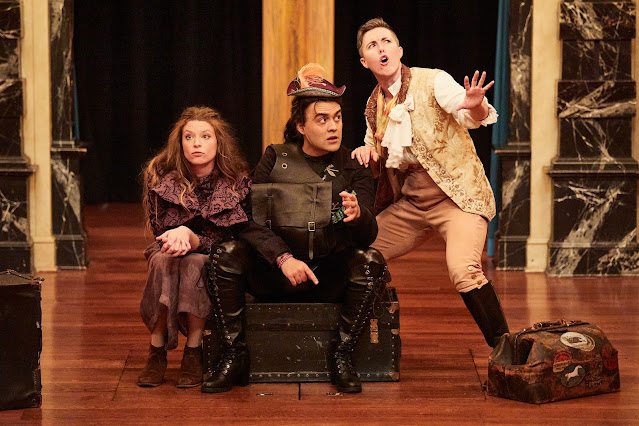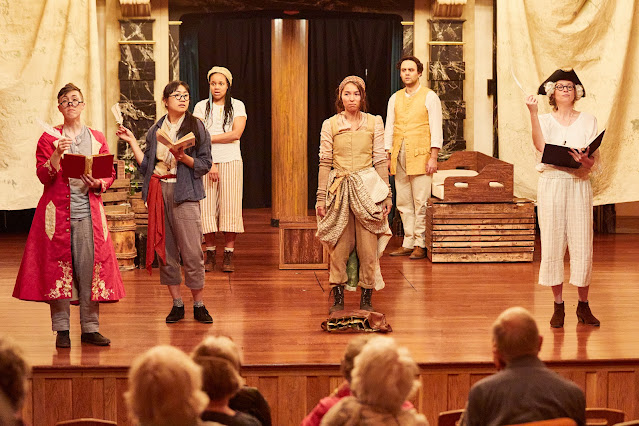Twelfth Night, and Thrive, American Shakespeare Center
One of the specialties of the American Shakespeare Center has long been its focus on producing plays in repertory, providing illuminating opportunities for plays to work in conversation with each other. In its current iteration, the ASC is leaning away from a previous practice of seasonal repertory companies and offering instead a few opportunities throughout the year for productions to intersect. I was able to catch the final week of the summer rep of Shakespeare's Twelfth Night and L.M. Feldman's Thrive, Or What You Will at the Blackfriars, the latter being the 2020 winner of the Shakespeare's New Contemporaries Award and inspired by Twelfth Night.
 |
| Meg Rodgers, Marcel Mascaro, Eli Lynn in Twelfth Night. Photo by Anna Kariel Photography. |
There have been many changes in the artistic leadership of the theatre in the last several years on top of a pandemic, so I've been eager to revisit the company under its current leadership, actor and Artistic Director Brandon Carter. Under Carter's tenure, if these two plays are any indication, there seems to be a new spirit of intentionality underscoring artistic choices. In an article in the Washington Post, Carter explained his goal of "‘decentering’ who [audiences] perceive to be in these stories, breaking the legacies of the action of the past." It feels like a particularly illuminating comment for these two productions, one a world premiere and one a well-trod Shakespearean comedy. In the past, ASC productions have felt self-contained in a certain sense, driven by the desire to remove the trappings that so often bog down modern productions and to do solid, spirited performances within their company style.
With this Twelfth Night, directed by Jenny Bennett, the production blossoms with a specific energy I haven't felt from the company before. ASC productions have always cast with gender as a malleable consideration, citing plays like Twelfth Night as reasons to crosscast gendered roles. Long ago, a list of Shakespearean staging principles published in the program read "Shakespeare didn't care about gender, and neither do we!" That language is gone from the current list of principles, and with good reason--judging from his plays, Shakespeare did care about gender, and more importantly, so do we. And while there has previously been excitement in the crossgender casting at the Blackfriars (most notably the recent much-spoken of production of Othello helmed by Jessika D. Williams), this Twelfth Night centers our relationship with gender in the same way that the characters themselves do within the text. How the characters perform gender in Twelfth Night is extremely revealing, and how they grow from their initial assumptions about how gender defines the world is an important measure of their journey. And spoilers, folks, but it turns out that when a character immediately jumps to dressing as a different gender as the solution to all of their problems, that character might not be cisgender! Two members of the company of actors are themselves nonbinary, and its genuinely exciting to watch them perform in a production that consciously throws open the doors and says, Yes, we want you to be thinking about not only what happens when we look past gender, but all that we gain when we realize how rich and varied gender can be.
 |
| Ensemble of Twelfth Night. Photo by Anna Kariel Photography. |
It's a rich and rewarding production, but it does suffer from the limited size of the ensemble. Six actors can make the play work, but the audience is conscious the entire time of just how hard they are working. I love good doubling as much as anybody, and heaven knows I don't want to imagine how much time it took to figure out the actor tracks and cut the script in a way that allowed for everyone to be where they needed to be at the right time and in the correct costume, but it did take over the energy of the play at times. Twelfth Night may be a comedy, but it's a rich and soulful story, and the inevitable Act V scene where all the characters arrive onstage together and unravel the mess that brought them there suffers a little from the farcical mechanics that make it work. It's interesting why the theatre decided to use such a small ensemble in the first place; many factors are likely at play, but it does feel like an extra hurdle for the production to have to clear.
 |
| Jihan Haddad, Marcel Mascaro in Thrive, Or What You Will. Photo by Anna Kariel. |
That said, much may be made clear simply by taking a look at the other end of the repertory: L. M. Feldman's Thrive, directed by Larissa Lury, and featuring the same ensemble of six actors. Feldman's play springs out a thematic connection with Twelfth Night that goes beyond "there's a boat and a journey of self discovery and it's made by a lady who put on pants." The play explores the story of Jeanne Baret, an eighteenth century herbalist-cum-botanist-cum-circumnavigator, and all the ways in which that story has mattered deeply to both the people in it and the people who came long afterwards, and the ways in which the story has been lost or withheld from us. Feldman's play pulses with the need to understand Baret's experiences precisely because of those lacunae in the her story as we have it, pieced together from contemporary accounts written by men and civil records. The outline of what we know: Baret joined an expedition to circumnavigate the globe as the assistant to the naturalist Philibert Commerson, during which she assumed the name Jean Baret and a masculine identity, before being violently revealed and ultimately removed from the voyage. Baret ultimately returned to France after the death of Commerson, and received both credit and a pension for the work she did assisting him in his work during the expedition.
Feldman's play depicts Baret as a person existing beyond these bare biographical details, filling in the gaps to create a rich and complex portrait of the person who lived through these events. The key framework for the entire play is a chorus of onlookers trying to make sense of the extant record, desperate to understand not just what happened but how Baret felt and why they made key decisions along the way. The play grapples with the impact of class, money, race, and the patriarchal structure of Baret's society along the way, but a crucial element for both Feldman's Baret and their onlookers is what being Jean meant to Jeanne. Crucially, the chorus refers repeatedly to "the māhū moment" to describe a historical encounter in Taihiti where Baret was revealed to not be a (cisgender) man. A Taihitian prince, Aotourou (Jasmine Eileen Coles), is portrayed as being entirely at ease with the notion that Baret might exist outside of the Western gender binary; no one else gives that ease to Baret, and there is precious little space for Baret to explore what being Jean could fully mean. So often, we run into dead ends trying to understand the sexuality and gender identity of historical figures because our contemporary language and understanding simply didn't exist in their world--Baret is a fascinating example of someone from a restrictive Western European upbringing who actually did encounter a culture with a more expansive understanding of the spectrum of gender. The play has no neat answer for Baret's own place on that spectrum, because we have no way of knowing; Feldman also can't deny that queer and gender nonconforming audiences today might be desperate for that historic reflection of their own experiences.
 |
| Ensemble of Thrive. Photo by Anna Kariel. |
One of the joys of Lury's world-premiere production, then, is that with Feldman in the room for the rehearsal process, the play has been partly shaped for this ensemble of actors. Every member of the ensemble takes on the role of Baret during the play, with Jihan Haddad's opening portrayal serving as a sort of anchor throughout, and it matters that when one member of the chorus is particularly urgent in their pleas to understand Baret's gender, that role is portrayed by trans nonbinary actor Eli Lynn. It also matters that in this production, there are no cis male actors, so that none of the men surrounding Baret are played by men.
Is it any wonder, then, that Bennett's Twelfth Night was able to enter this same space and be the production that it is? This question of who the hell are we if we get to choose exactly who that can be starts in Shakespeare and blooms directly into Thrive. Theatres across the world are struggling, from Broadway to the smallest regional playhouses, to find out how to make theatre in the time of Covid and how to keep the lights on when audiences have been slow to return. It matters more than ever why, specifically, each theatre wants to keep making theatre, and how they choose to make it happen. After two nights back at the Blackfriars, it feels like the ASC's answer is that they have to find the stories that matter to us now, and see what form they can take in this special place in the Shenandoah valley. What happens to Shakespeare when who is in the room is different? With the Shakespeare's New Contemporaries project, which I very much hope continues on for many years, what are the questions that Shakespeare inspires us to ask now? For my own sake, I'm very glad to have been in the Blackfriars again to see what new artists can do with new questions, and hope this universal lighting stays on for a long time.
Comments